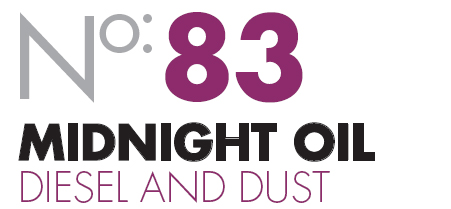
CBS
Produced by Warne Livesey
Released: August 1987
TRACKLISTING
01 Beds Are Burning
02 Put Down That Weapon
03 Dreamworld
04 Arctic World
05 Warakurna
06 The Dead Heart
07 Whoah
08 Bullroarer
09 Sell My Soul
10 Sometimes
11 Gunbarrel Highway
In the winter of 1986 Midnight Oil spent a little over a month on the Blackfella/Whitefella tour of Aboriginal settlements in Northern Australia. Jim Moginie, the band’s guitar/keyboard genius, articulates what is a shared band view: ‘My life is divided into two halves, the first half is before the Blackfella/Whitefella tour, and the second half is everything after’. The adventure was a first-hand lesson in the beauty of the Australian heartland, the resilience and deep spirituality of the indigenous people who live there and the terrible privations that have been visited on these people since the European settlement of Australia. Midnight Oil’s response was their stunning sixth album.
‘When you lie back in your swag in the desert looking up and you’ve never seen the heavens so bright,’ drummer Rob Hirst wrote in 2008. ‘Sometimes it’d scare you out of your skin. You understand why Aboriginal peoples’ lives and their dreaming are all related to what happens in the sky. Gradually, we learned how to use space in our music, to breathe the slower rhythms of the desert. In other words, to fill the gaps between the beats, notes and words with “The Great Quiet”.’

The band – Moginie, Hirst, singer Peter Garrett, guitarist Martin Rotsey and bassplayer Peter Gifford – returned to Sydney and distilled their experiences into Diesel and Dust. They already had ‘The Dead Heart’ and the evolving ‘Beds Are Burning’, and Moginie added ‘Warakurna’ and Hirst ‘Bullroarer’. The album was rounded out by tracks that were pro-conservation (‘Dreamworld’), anti-nukes/anti-terrorism (‘Put Down That Weapon’ – a reaction to the sinking of Greenpeace’s Rainbow Warrior) and the more personal, existential dramas that occasionally found their way into the band’s canon (‘Whoah’ and ‘Arctic World’).
The band spent months rehearsing and demoing the tracks to get them just right. ‘We wanted to get all the fat out of the songs. Simplicity was the key,’ remembers Moginie. ‘Rob became very interested in the idea of a driving beat. We’d used drum machines a bit in the past. He’d always said in jest, “Machines play so relaxed”, which Kraftwerk said anyway. But that feel, played on the drums combined with the acoustic guitars on which the songs were written around campfires sounded fresh, so we went with it.’
The band settled on Englishman Warne Livesey to produce Diesel and Dust, largely based on his work on The The’s acclaimed album Infected. Recorded in early 1987, at Albert studios in Sydney, Moginie remembers the sessions as having a great spirit and being ‘remarkably easy’.
The creation of the song ‘Beds Are Burning’ is a perfect example of the Midnight Oil chemistry at its best. ‘I had the chorus, that was the foundation point,’ Hirst explained to journalist Debbie Kruger. ‘Then we had some dummy lyrics for a while, until we went to the desert, and I rewrote the lyrics. Then Jim had the riff … and we had a basic song. Pete came in and said, “We’ve actually got to make a statement”, as is Pete’s wont. He said, “Something like ‘The time has come!’ You know, ‘Give it back!’”. And I said, “Right, okay” … Jim said, “We need something to wake people up at the beginning of the song”. So three big chords, like a wake-up call. And then Warne Livesey had the idea of throwing the drum kit down the stairs, that big percussive break.’ The song about the Western Desert became a hit single from New York to Paris.
In an interview with the band during the Blackfella/Whitefella tour Hirst said, ‘I’ve always had this dream that this band could write an Australian music that people overseas could get on to and understand and which would enlarge their whole vision of Australia past Vegemite sandwiches and kangaroo hops’. With Diesel and Dust that dream came true.